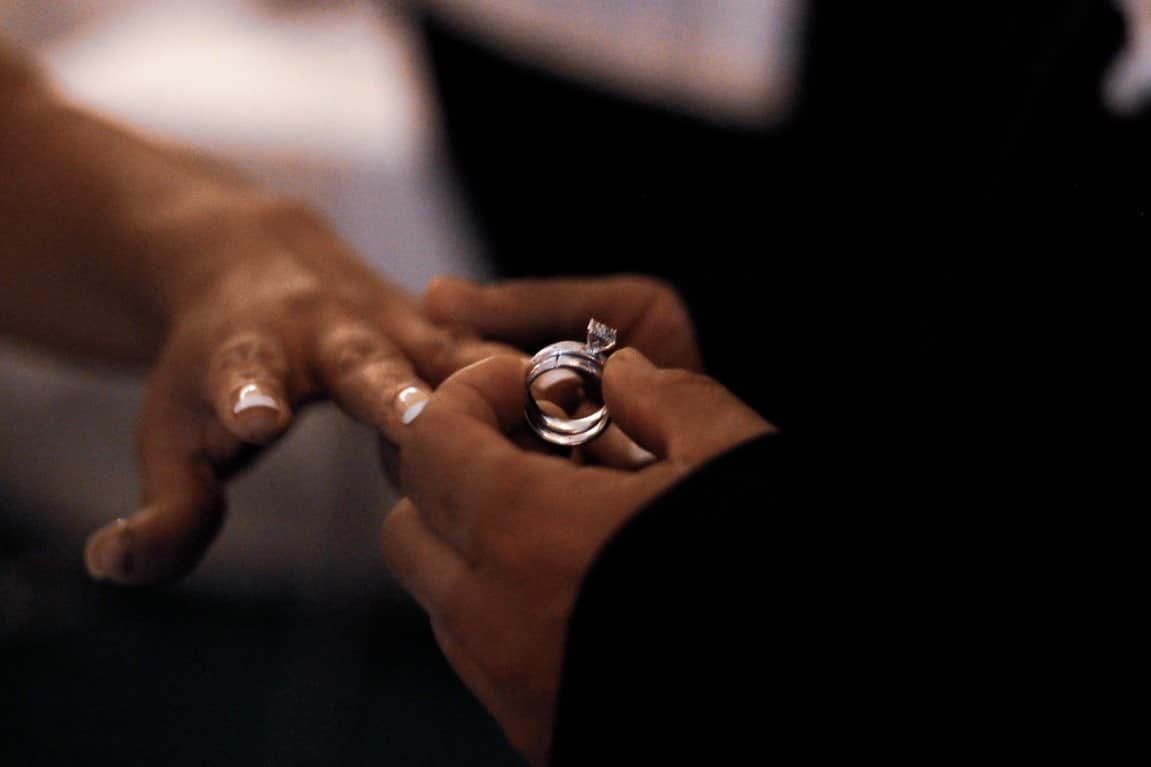It is estimated that there are around 1.91 billion Muslims worldwide. Muslim communities across the globe, such as those in Egypt and Lebanon, have unique and universal wedding traditions that are shaped and influenced by their religion and country. It’s essential to note that practices might vary across different cultures and interpretations of Islam, so the information provided here should be taken as general guidance.
Do Muslims wear wedding rings? Yes, they can, as a symbol of commitment, but with certain guidelines to ensure they align with Islamic teachings. It’s vital for Muslims to remember the true essence of marriage and commitment, beyond the symbols and accessories. If a wedding ring does not contribute positively to their marital and religious life, then it’s worth reconsidering its place in their union.
The question of whether Muslims wear wedding rings is answered in detail below. Additionally, other rules Muslim couples have to follow are also listed and explained.
Islamic Traditions and the Symbolism of Wedding Rings

As stated above, Muslims are allowed to wear wedding rings as an expression of their commitment and love for one another. Likewise, they can wear it simply because they like the look of it. However, there are certain considerations to keep in mind to prevent the act of wearing rings from becoming sinful.
Men Are Not Allowed to Wear Gold
According to Ibn Majah, the Prophet Muhammad forbade silk and gold adornments for men. This includes gold teeth, gold watches, and gold rings. In contrast, women are allowed to wear these materials.
Do Not Believe That a Ring Will Protect Your Marriage
Across many cultures, wedding rings are a symbol of a couple’s commitment to each other and their relationship. Wearing rings with this purpose in isolation makes it perfectly concordant with Islamic beliefs.
However, there is also a tendency for couples to think that just because they are wearing rings, their marriage is protected from harm and temptation. Wedding ring engravings are also frequently pointed out in the same vein; some criticize the act of carving names on rings and state that it does not help strengthen the bond between couples.
Islamic teachings stress that only Allah can protect you and your relationship. Ascribing this power to wedding rings is considered to be unintentional shirk. Shirk refers to the act of allocating something as Allah’s equal and is seen as an unforgivable sin.
Muslims committing unintentional shirk through their wedding rings violate another Islamic teaching: they are not allowed to wear the name of Allah. Furthermore, they are prohibited from entering a bathroom while wearing the name of Allah, as it is seen as disrespectful to Allah Himself.
Do Not Be Boastful
No one can deny that jewelry is a gorgeous accessory that can elevate anyone’s outfit and confidence. With that said, Muslim couples must wear wedding rings with the right intentions; they should wear theirs because they like it, not because they want to show off.
Islamic teachings rebuke pridefulness and having an inflated ego. Egoism leads Muslims to believe that what they have is solely the fruits of their labor, forgetting the benevolence of Allah. Furthermore, extreme pride is viewed as an impediment to self-actualization. Essentially, people with too much pride are setting themselves up for disaster.
Wedding Rings Are Not Required by Their Faith
Other people posit that wearing wedding rings is forbidden by Islamic law because rings were not included and introduced in scripture, making them bid’ah. Thus, incorporating wedding rings into your ceremony would be considered bid’ah and against the Islamic faith.
However, if exchanging wedding rings is to be viewed as a cultural practice and personal choice not required by Islamic teachings, then it cannot be considered bid’ah.

Etiquette for Wearing Rings
Islamic teachings instate certain rules for couples if they want to wear a wedding ring. On one hand, women are allowed to wear rings on any finger they prefer.
On the other hand, men only have three options: their thumb, ring finger, and little finger. Scholars of Islam posit that a man should wear his wedding ring on his little finger, so the ring will not be an impediment to the completion of his daily activities. Contrastingly, wearing a ring on his index or middle finger is seen as a detestable act.
On the topic of which hand Muslims should wear their wedding ring, An Islamic scholar proposed that one should wear a ring on the right hand if it acts as an accessory. If the ring will be used to give seals or stamps, then one should wear it on the left hand.
Broader Muslim Marriage Customs
Cohabitation Before Marriage Is Not Permitted
Islam does not permit any physical relationship, which includes moving in together before a couple is officially married. More than anything, it is a safety net for couples; there is a lower likelihood that pre-marital sex and unplanned pregnancy can occur if couples do not live under one roof. Moreover, without the legal protection that marriage provides, unmarried couples who live together can get in a financially tight spot during emergencies.
The Groom Must Have the Bride’s Father’s Permission
It is forbidden for Muslim women to marry without their father’s explicit permission. In the absence of a father, the groom must approach the bride’s older brother, the father’s older brother, or any man who acts as the bride’s guardian. The importance of this step lies in the fact that a woman is her father’s responsibility until the day she gets married. Without approval and permission, the wedding cannot take place.
No Dating Before Marriage

When a man becomes of marriageable age, his family will seek a respectable bride and offer him to the girl’s guardian as a wedding prospect. Although the two families will get to know each other, dating is highly rare in Muslim countries. Instead, once the girl grants consent to the marriage, the marriage contract is prepared and arrangements for the ceremony are handled.
Hierarchy Within an Islamic Marriage
Once a Muslim woman gets married, she leaves behind her own family to serve her husband. As they create their own family, it becomes the husband’s responsibility to work to sustain the household. He is seen as the leader of the family, whereas the wife’s role is to support and nurture her family.
This hierarchy entails that a wife must obey and fulfill her husband’s orders. However, Muslims share the belief that the strength and happiness of marriage depend on the wife’s happiness. She must be cherished, loved, and respected.
Polygyny Is Allowed
A form of polygamy is permitted in Islam: polygyny. Men are allowed to have more than one wife, granted that they can support every wife and family equally. The Quran explicitly gives permission to men to marry two to four women if they are able; if they are not capable of being fair to them, then he should stick to one wife.
Before marrying another spouse, the first wife must grant permission before the consequent marriages can be solemnized. This is a symptom of the hierarchy present among the co-wives of one man — the first wife and family take precedence.
Muslim women, however, are not allowed to marry more than one man.
Final Thoughts
So, do Muslims wear wedding rings? Muslims are allowed to wear wedding rings as a cultural symbol of commitment. With that said, there are guidelines they have to observe so that their rings cannot be considered haram, or forbidden by Islamic law. At the end of the day, if the rings are not contributing to the betterment of their marital and religious life, that is when they need to stop wearing the rings.